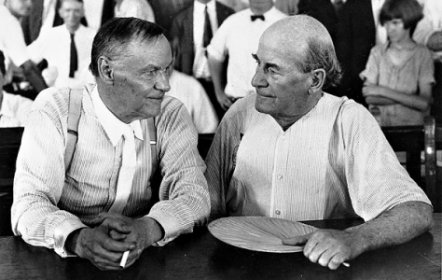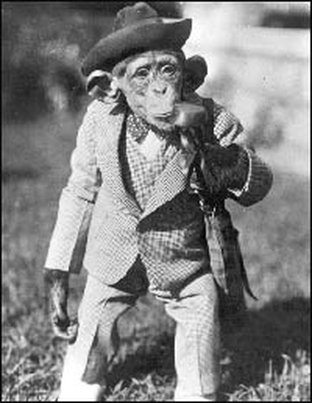The "Monkey Trial" of Dayton, Tennessee
“I furnished the body that was needed to sit in the defendant's chair.” ― John Scopes (Explaining his role in the Scopes Trial)
Importance
|
The Scopes Trial was a highly publicized case over the constitutionality of the Butler Act, a Tennessee state law against the teaching of evolution in schools. The Scopes Trail was the most important historical event of 1925 because of its broad social significance. It represented the clash between fundamentalists and modernists over Darwin’s theory of evolution. On a larger scale, the case represented a collision of traditional views and values with emerging modern views during the 1920s. Fundamentalists felt that the authority of the Bible and Christian morals in society was being undermined.
The Scopes trial was a show trial that offered fundamentalists and modernists a setting to debate loose vs. strict interpretation of the Bible, and creationism vs. evolution. Following the Scopes Trial, Arkansas and Mississippi followed Tennessee’s example and passed legislation banning the teaching of evolution in schools. The debate of evolution’s role in school curriculums has continued to the present day. |
The Butler Act and a Scheme to Put Dayton on the Map
|
H.L. Mencken on Bryan:
"He leads a new crusade, his bald head glistening... One somehow pities him, despite his so palpable imbecilities... But let no one, laughing at him, underestimate the magic that lies in his black, malignant eye, his frayed but still eloquent voice. He can shake and inflame these poor ignoramuses as no other man among us…" |
The Butler Act, signed into law on March 21, 1925, prohibited the teaching of "any theory that denies the story of the Divine Creation of man as taught in the Bible, and to teach instead that man has descended from a lower order of animals." Tennessee was the first state to ban the teaching of evolution. Shortly after the enactment of the Butler Act the American Civil Liberties Union ran an ad in a Chattanooga newspaper, seeking teachers willing to challenge the Butler Act.
A group of town leaders in Dayton, Tennessee responded to the ACLU’s search. The ACLU asked teacher John Scopes to test the legitimacy of the Butler Act in a high-profile case. Scopes, a high-school science teacher who only taught biology as a substitute teacher, agreed and was indicted on May 25, 1925 for teaching evolution. The American Civil Liberties Union backed his defense. Residents of Dayton welcomed the case, hoping that it would put the town in the national spotlight and stem the tide of people leaving the economically downtrodden town. The TrialDuring the trial thousands of people from all political and religious perspectives, along with newspaper reporters flooded the city of Dayton. The Scopes Trial was the first U.S. trial broadcast live over a national radio network. The Scopes Trail was a legal battle between the great orators of the day. Famed criminal lawyer Clarence Darrow defended Scopes and former presidential candidate William Jennings Bryan was a part of the prosecution.
Judge John T. Raulston was openly sympathetic to Bryan and the prosecution during the trial and refused to allow Darrow and the defense team to call scientific experts to argue the validity of evolution. In spite of this, Darrow's defense of Scopes and evolution was highly praised from outside observers. The climax of the case came when Darrow called Bryan to the stand as a biblical scholar. Darrow ruthlessly questioned Bryan about whether or not the Bible should be interpreted strictly. Five days after the trial ended Bryan died of a stroke. At the conclusion of the trial, Darrow asked the jury to find Scopes guilty so that he could appeal to a higher court. After deliberating for only nine minutes, the jury found Scopes guilty of violating the law and fined him $100. Bryan and the ACLU offered to pay the fine. In 1927, the Tennessee Supreme Court upheld the lower court’s decision finding the Butler Act to be constitutional. However, it overturned Scopes' verdict on a technicality, ruling that the jury, not Judge Raulston, should have set Scopes’ fine. The justices stated in their ruling that "[n]othing is to be gained by prolonging the life of this bizarre case." It is not until 1968 in Epperson v. Arkansas that the state Supreme Court struck down The Butler Act. |


